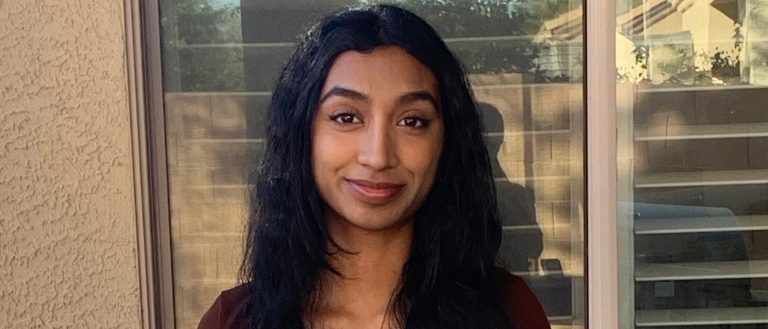Major: Neuroscience, pre-med track
Minor: Medical anthropology
Year: Rising third-year
The human brain is incredibly complex. It’s responsible for our emotions, everything we feel and every thought we have.
Latavya Chintada, a CWRU undergraduate pursuing a major in neuroscience and a minor in medical anthropology, wants to know more about it. Specifically, she’s exploring how researchers can use neuroscience to prevent or treat problems that affect the brain, such as mental health disorders.
“The brain is so vast — there is still so much we don’t know about ourselves,” Chintada noted.
Chintada has put her interests to work as president of NAMI on Campus, the CWRU branch of the National Alliance on Mental Illness. The mental health advocacy organization seeks to educate, empower and support students with mental illness and their peers through information, support groups and more.
Earlier this year, the members of NAMI on Campus came up with the idea of preparing care packages for students in quarantine for COVID-19, after one of their executive members, who experienced quarantine, explained how socially isolating and mentally tiring it was.
“NAMI students collaborated with each other to plan out the event and the materials,” Chintada explained. “During the socially distanced event, we packed these care packages and wrote some inspirational notes to include as well.”
As president of NAMI on Campus, Chintada planned and oversaw the group’s efforts. She reached out to University Health and Counseling Services about delivering the packages, when she was directed to CWRU’s emergency specialists.
From there, Chintada worked with the specialists to have the care packages delivered back in April. Inside, students found a variety of self-care items to help with mental stress or anxiety from social isolation—tea packets with honey, hard candy, fidget spinners, adult coloring books, hot chocolate, hand lotion, and a letter from NAMI.
“While we did not deliver the packages directly to the students due to health concerns, we heard back from the emergency specialists that the packages were well-received, and the students were grateful,” Chintada added.When she’s not advocating for her peers’ mental health, Chintada is busy being a staff columnist for CWRU’s The Observer; a tutor for Students for Refugees; and a member of the Campus Initiative Committee. She’s also the president of CWRU Unmasked, an app designed to offer a supportive, anonymous community for CWRU students. Chintada also conducts research for University Hospitals.

